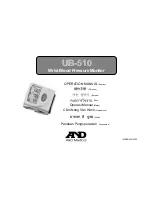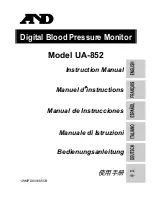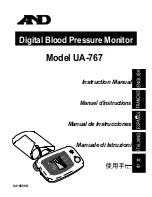
28
External Control (cont.)
Using the serial communication
You can control the monitor from a personal computer etc. via the RS-485 or RS-232C terminal.
●
Consult your dealer for the details of the external control specification.
<Communication specifications>
Input terminal
Cable
Terminal
specification
Communication specifications
RS-485
A straight LAN cable
→
See below
Baud Rate: 4800 bps
Data Bits: 8 bits
Parity: No parity
Stop Bits: 1 bit
Flow Control: No control
Communication Code: ASCII Code
RS-232C
A straight cable with a D-sub 9-pin connector (male
for the monitor, female for the personal computer
etc.)
<Specifications of the RS-485 terminal>
Pin No.
IN terminal signal
OUT terminal signal
1
TXD +
TXD +
2
TXD −
TXD −
3
RXD +
RXD +
4
NC
NC
5
NC
NC
This is a female terminal.
6
RXD −
RXD −
7
NC
NC
8
GND GND
<Specifications of the RS-232C terminal>
Pin No.
Signal
1
NC
2
RXD
3
TXD
4
NC
5
GND
This is a female terminal.
6
NC
7
RTS
8
CTS
9
NC
●
The 7th terminal and the 8th terminal are connected.
<Command outline>
All commands consist of the following segments.
Header
Monitor ID
Command ID
Function
Data
Cr (0Dh)
On Header
“!”
: Operation commands from the personal computer, etc. (
→
<Basic command list> on page 29)
“?”
: Reference commands from the personal computer, etc.
“@” : Status returns from the monitor
To start communication, send the connection command from the personal computer etc. To terminate the communication, send the
termination command from the personal computer etc.
Example of communication procedures
PC, etc.
Monitor
1
Starting the communication: connection command (!00BCN1Cr)
2
Monitor’s status (@00BOKCr)
3
Selecting “SDI 1/L” input (!00BINACr)
4
Monitor’s status (@00BOKCr)
5
Terminating the communication: termination command (!00BCN0Cr)
6
Monitor’s status (@00BOKCr)
DT3D24G1̲EN.indb 28
DT3D24G1̲EN.indb 28
11.1.25 0:53:56 PM
11.1.25 0:53:56 PM









































